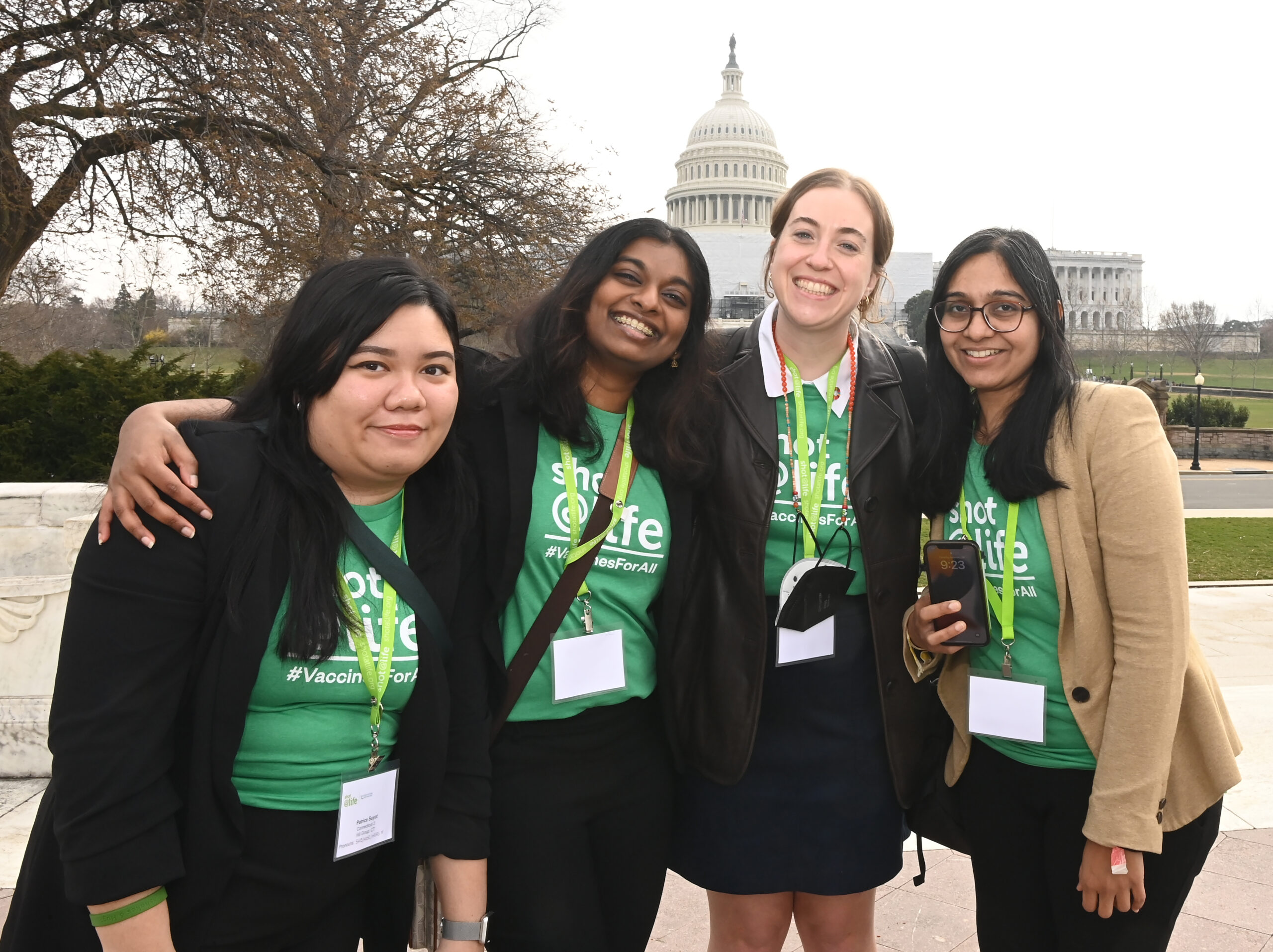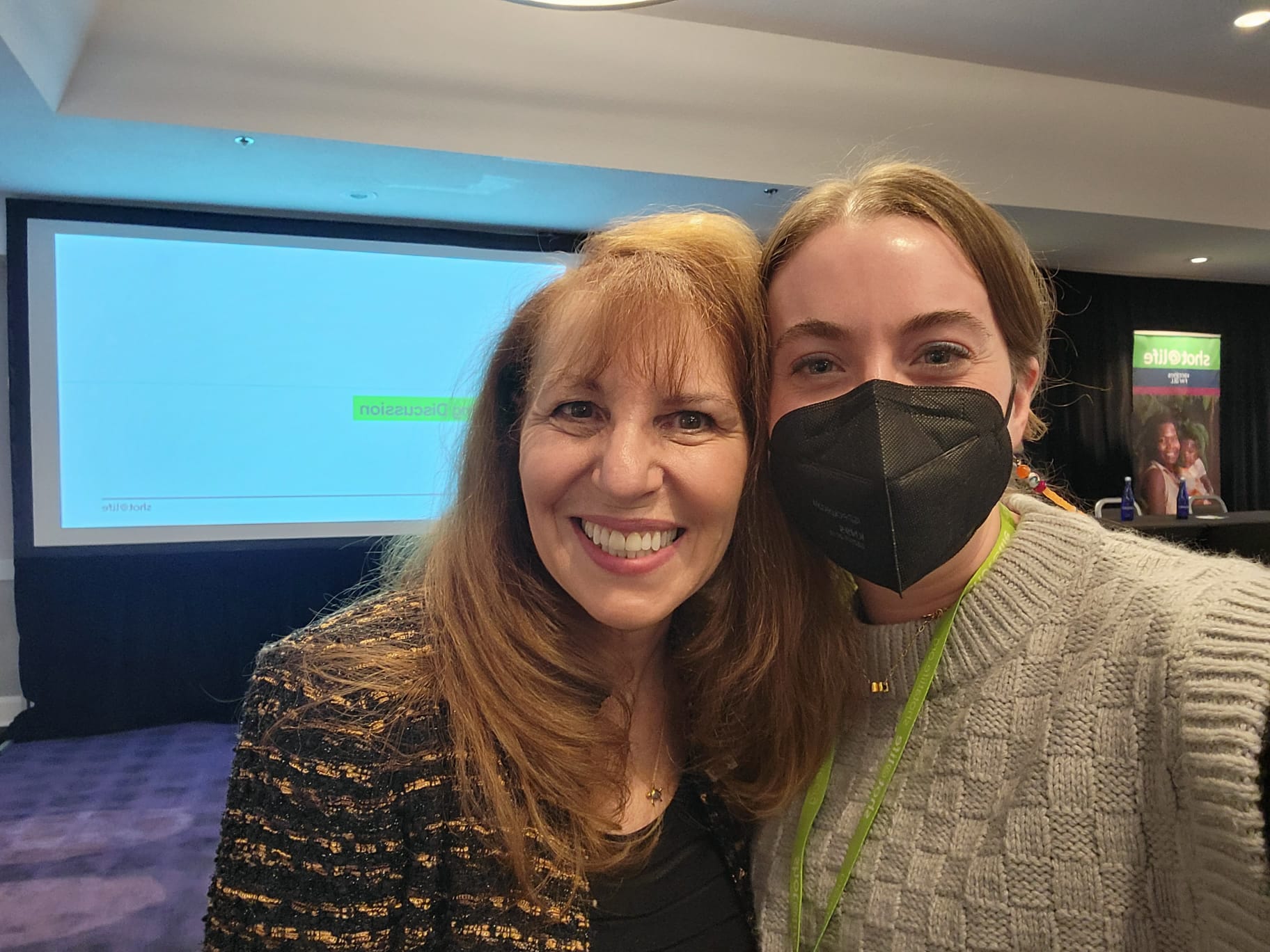Champion Spotlight: Sydney Perlotto
Sydney Perlotto has extensive experience working with USAID, an agency that supports Shot@Life’s mission. Now, as a public health master’s student with a concentration in social and behavioral sciences at Yale University, she has joined Shot@Life’s cause as an advocate.

Shot@Life: How do you think your previous experiences have informed your advocacy work?
Sydney Perlotto: Prior to returning to school to get my master’s degree, I worked in many global health roles for eight years. I studied international development and gender in undergrad, which prompted me to work in the global reproductive and maternal child health space. Most recently, I worked as an institutional service contractor with the Office of Maternal and Child Health at the U.S. Agency for International Development (USAID). Immunization investments fall within that office, which is how I got engaged in immunization policy and programming.
I learned about Shot@Lifed uring my time at USAID. Our organization works with countries and USAID missions to implement and run childhood immunization programs. My time on this team helped expand my knowledge of immunizations, and it also inspired me to focus on them as an essential public health intervention.
Fun fact: I first interviewed for the job at USAID in February 2020 at the start of the COVID-19 pandemic. So, it was an in-person interview, but I never returned to the office. That was interesting because I went in knowing that I was going to work on childhood immunization program without realizing that it was going to be in the context of the pandemic. I supported a lot of experts who were called to work on COVID-19 vaccines. Early on during those lockdowns, I was in a policy communications and knowledge translation role. My job was to take those stories and the expertise of our technical team members and put that together in ways to make leadership aware of what was going on. It was interesting and stressful at times, but I learned a lot in those two years.
What inspired you to return to school? How did you find Shot@Life?
I spent the first years of the pandemic supporting the U.S. government’s maternal and child health investments, which includes immunizations. Afterwards, I knew I wanted to go back to school, so I could have the time and mental space to study these issues I care so much about and do a deep dive into the content. I had a lot of practical skills and knowledge already from working professionally for so long, and I knew how organizations and systems operated from that experience. But I wanted to investigate and analyze the meaning of these issues in our current context. Also, as someone who studied history for a large part of my undergrad, I wanted to go back in time and study how we have arrived at our current moment, particularly for vaccines, since we’ve seen the rise of vaccine hesitancy both in the U.S. and globally. I’m also interested in exploring these topics not only from a policy side, but also from a social and behavioral sciences side, which is my concentration. For example, I’m taking a vaccine policy class this semester, which is taught by a historian, and we are looking at the motivations and decisions that go into vaccine development, regulation, and distribution, both at the individual level up through the institutional level.
With Shot@Life specifically, I was aware of the campaign through my work at USAID and had worked previously with our technical experts when they presented at previous Summit events. I also used the Shot@Life website a lot as a resource when working on assignments because, as someone who’s interested in accessible information, I find that Shot@Life does a great job of explaining why immunization is important and how to talk about the issue in understandable ways. My time on the website was how I saw the application for this year’s Summit. Since this is something I’m studying and am very interested in, I wanted to be a champion for these programs.
I really believe strongly that in order to work on global issues, we should also be looking at how they are manifesting in the local context. Even though I’ve worked in global health and I’m studying these vaccines from an international policy lens, I’ve also been appreciative of Yale’s program for its emphasis on writing op-eds and public testimony for local legislation.

So, you were somewhat connected to Shot@Life in your previous work, but how was it different attending our Summit?
I want to preface that I’ve been to a lot of conferences, and I found Shot@Life’s to be extremely well organized and energizing. I had also never done a Hill Day before, so that was an exciting learning experience. The Summit did a great job of expanding my knowledge of what advocacy looks like at the federal level as a constituent rather than as someone working in public service — from the elected policymaking side versus the federal agency side.
One of the most unexpected but exciting things that happened at the Summit was learning that Shot@Life is expanding its mission to focus on global immunizations across the life course. As someone who has worked with maternal and child and adolescent populations, I think it’s so important to look at these issues from a holistic and equity lens. I’m also very passionate about HPV vaccinations because that’s something that brings my passions together. To me, I was super excited by that announcement, and I think it’s going to level up the program’s ability to share stories of individuals who are most vulnerable to disease or inequity.
What did you enjoy most about advocating on the Hill?
It was great to interact with representatives and their aids in that way. I am also a new resident of Connecticut, and I’ve been interning with the Connecticut General Assembly, so I’ve been doing a lot of supporting legislators at the state level.
I was also surprised by how young the advocates were for Connecticut, compared to the rest of the Summit attendees. All of us were studying public health and medicine as students in some capacity. Clearly, there’s this focus and investment from my generation in the importance of immunizations. It’s my hope that the COVID-19 pandemic has raised awareness among the youth on the importance of immunizations and what that looks like for people everywhere, not just in the United States.
From your advocacy work, what are you most proud of?
I have done more advocacy on reproductive health and maternal mortality in terms of awareness campaigns and reaching out to legislators and volunteers. But this was my first time doing it for immunizations, and I was excited to bring my immunization story to the table.
I love writing testimony now that I’ve been introduced to it. I took civics in government in high school, and I had civic engagement and nonprofit leadership classes in undergrad. A lot of those classes focus on voting or movement building. But now that I know that for any legislation, I can write 1–2 pages on what’s good or bad about it, how it impacts me, I feel like that’s a powerful thing that I want to take with me the rest of my life. Obviously, the testimony I’ve written so far has been required as part of my coursework, but I’m appreciative of this simple thing. It feels very powerful to be able to advocate for the things I find important through testimonies.
How do you hope to see your advocacy continue to grow in the future?
I’m excited to be back in school and getting my degree. I want to continue looking at both these local and international issues, such as vaccines, reproductive health, and maternal health, that have a lot of connections.
As someone who has worked in communications and knowledge translation roles, I know there is a lot of important research out there that isn’t necessarily reaching the right people. I want to continue being an advocate as a public health expert to make sure this information is getting to the right people who are making legislation or creating programs.
Want to become a vaccine advocate like Sydney? Start by signing up to become a trained Shot@Life champion here.
